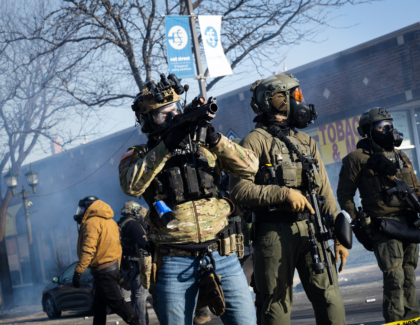Sign up for the daily CJR newsletter.
In a historic case, the US Supreme Court this week heard arguments on the validity of state same-sex marriage bans. The hearing combined cases from Ohio, Tennessee, Kentucky—and Michigan, where a lesbian couple with four adopted children are prevented by state law from sharing legal parental rights.
Few people know the Michigan case better than Rick Pluta, the state capital bureau chief for the Michigan Public Radio Network, which reaches listeners on stations across the state. Pluta has covered the story since April DeBoer and Jayne Rowse filed their lawsuit four years ago. At the time, they were simply challenging Michigan’s adoption restrictions for same-sex couples: It was a federal judge who suggested that to prevail, they had to aim directly for the marriage ban, passed by voters in a referendum 11 years ago.
Pluta was in Washington, DC, this week to cover the Supreme Court arguments. It wasn’t his first rodeo: he also covered Supreme Court cases on affirmative action and tribal casinos. But this time, the stakes are unusually high. And Pluta has been a strong, clear, and fair-minded narrator as this local story went national. In broadcasts, he neatly reminds listeners of the roots of the case—including how the DeBoer and Rowse case initially did not have the support of leaders in the LGBT community for their lawsuit—without overburdening a swift-moving story.
CJR spoke with Pluta on Wednesday about tracing the story to the big stage. A portion of the interview is below, edited for length and clarity.
How did you pivot from covering a local story to a national story?
I landed in DC with kind of a conceit. I’ve covered this case since the district court level. I covered it when it was still an adoption case. I know everyone, I’ve talked to everyone, I know not just the legal arguments but the thoughts and feelings the principals have about how they came to be here. I’ve spent time at April DeBoer and Jayne Rowse’s home, and talked about the case in [Michigan attorney general] Bill Schuette’s office. I charted the state’s evolution from a defending a marriage ban to now defending the people’s right to vote on a marriage ban—a subtle but critical distinction.
So I felt a sense of ownership over it, as opposed to these people who just dropped in at the Supreme Court level.
And then, once I was sitting there, I realized that I know the story really well, but I don’t know the Supreme Court. I’ve been there several times to cover stories, but I’m not there to see the workings of it day in and day out—how the justices approach things, whether a line of questioning is significant, if it means something that Justice Scalia is, instead of sitting all the way back in his chair, is actually sitting up and engaged. That’s one of the things in public radio that we expect from [NPR legal correspondent] Nina Totenberg. She does that remarkably well. And it’s not at all in my toolbox.
I could not have done my job without SCOTUSblog. That is just a fact. When SCOTUSblog says this or that is an issue, or points to the importance of previous decisions on this case, it comes from a different level of knowledge and scholarship. I am very familiar with this case, but the Supreme Court has its own context and history that will apply to this decision. I mean, I don’t have a fucking clue why Justice So-and-So tilted their head that way!
If you value what national outlets bring to the story, and to your reporting, do you think that respect goes both ways?
When you’re swapping stories in the pressroom, there can be a little bit of one-upmanship. One of the things that happened in this case back in Michigan that has been under-covered as a national story is the difficulty that the DeBoer and Rowse team had in getting support from the LGBT community for their lawsuit. This was part of my regular coverage. Now, it is a star case with the ACLU and GLAAD and all those groups involved. But in the beginning, you know, they didn’t like their prospects in Michigan or in the Sixth Circuit court—and they turned out to be correct in that regard. They told [DeBoer and Rowse] that if they pursued this lawsuit, they would be doing it on their own. And this is with really compelling litigants—licensed nurses who take in special- needs kids. Even the state had to say that they weren’t going to argue their fitness as parents. And now, this is one of the cases that made it all the way to the Supreme Court. But they started out all by themselves. And they haven’t forgotten that.
There are so many things that don’t make it into the coverage, like the drama of the internal disputes, the things that are really papered over at the time for whole variety of reasons. I think I’d like to write book about this case. You need perspective on a big story like this, all the color and layers that provide value for our audience on top of what they might be getting from other journalists, both local and national.
How do you bring something new to a story that had a swarm of journalists on it?
I had multiple things to do at once: feeding the newscast with spot news, doing longform stories, and going on local programs to explain what was going on. I know Nina Totenberg’s covering the case on the major magazine shows that every station carries, like All Things Considered. I don’t need to match what she does, but add to it.
If the national coverage is focused on the court, and the interactions between justices and attorneys, I can do the human-focused storytelling. What is it like for April and Jayne to be there in Washington? What happens back home when all this is over? What will it be like to wait for the decision? There’s also the big spectacle outside the courtroom, a lot of demonstrators that presents an easy dramatic hook. This is the time when people come out with everything the have, and it will end in either hope or despair.
Also, Jake Neher, my partner in the state capital bureau of Lansing, picked up on a legislative committee hearing about a possible religious freedom act in Michigan. That made a nice pairing for what’s happening in Washington: Here you have Lansing lawmakers making preparations for same-sex marriage being legal.
What advice do you have for reporters who cover a Supreme Court case for the first time?
I called an NPR producer before the first time I covered the court and asked what I should do. They said, “Just fake it. Go in looking like you know what you’re doing.” That person could not have been more wrong. As it turns out, the public information staff at the Supreme Court is really anxious to work with you. There was no condescension, just information on what you need to know, including timelines. Communicate with those people. They are very good at what they do.
And it may seem obvious, but call ahead. Make sure press credentials are in order. They like a letter in advance on a news organization’s stationary. It’s a bit of a hassle, but a much tinier hassle then showing up with no one having any idea who you are and why you’re there.
Has America ever needed a media defender more than now? Help us by joining CJR today.






